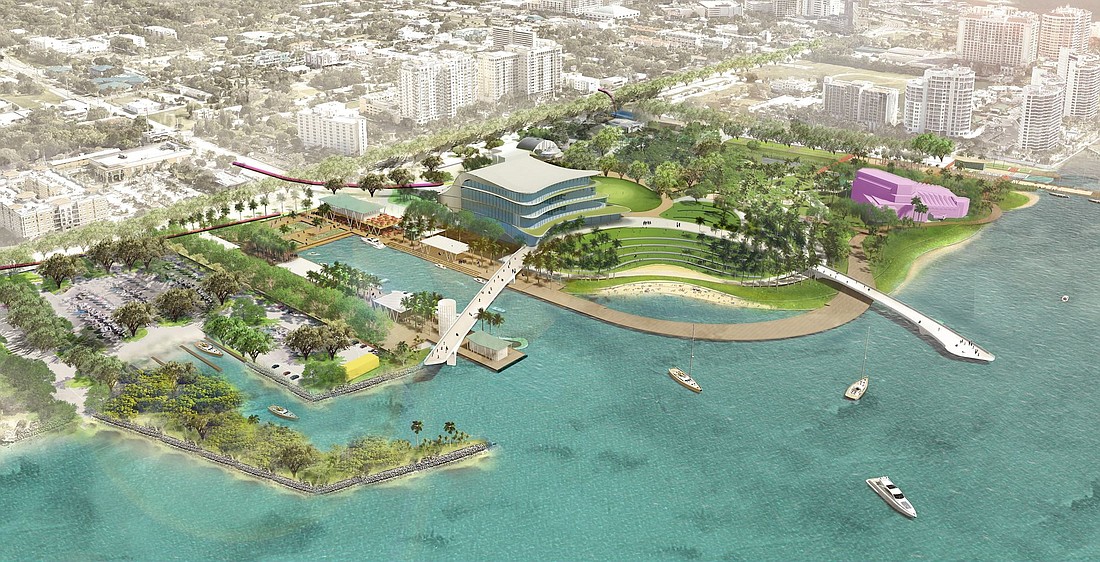- April 11, 2025
-
-
Loading

Loading

A week after it was formed, the committee tasked with recommending an architecture firm to design the proposed Sarasota Performing Arts Center at The Bay met on Monday to launch the six-month process.
That’s the timeframe laid out to the panel by New York-based Paratus Group, a consulting company that guides museums and cultural institutions through complex building projects.
Primarily an orientation meeting, the five-member SPAC Architect Selection Task Force introduced themselves to each other, to the extent that was necessary, and to the public. It also received instruction from Assistant City Attorney Michael Connelly regarding Florida’s Sunshine Laws, which require transparency in all matters regarding public investment.
They were also primed on Florida’s Consultants Competitive Negotiation Act, which defines the process for state government agencies, municipalities, school boards and school districts to hire professional services using a qualifications-based selection process rather than on a lowest bid basis.
“It applies whenever an agency — of which the city is an agency — is going to seek a professional service,” Connelly said. “Those professional services are architects, engineers, landscape architects, and surveyors and mappers, so it applies to you all because you're looking for an architect. You have to follow the CCNA statutory procedures.”
That’s a three-step process that begins with a public announcement of qualifications proceeding, starting with a request for qualifications process, applications from which a group will be selected to respond to a request for performance. The RFQ was scheduled to posted by the end of the week.
Step two of the process is narrowing the pool of candidate firms from the RFQ applicants to a minimum of three. The third and final step is to select the winning firm following site visits and public Q&A, and competitive negotiations with the selected recommended firm. Prior to this stage no financial matters may be discussed. Guidelines require that if the parties cannot agree to terms, the task force commences negotiations with its second choice, and so on.
The anticipated budget for the SPAC project is $275 million.
Once selected and terms established, the task force goes before City Commission for approval of its recommendation.
Specifications of the RFQ include a 2,100-seat main hall, a 300-seat flexible performance space and a total of 165,000 square feet of building utilizing inside and outside education, event and rooftop spaces. The replacement of the Van Wezel Performing Arts Hall is part of the The Bay park project, a reimagining of the city-owned, 53-acre site along Tamiami Trail between Boulevard of the Arts and the 10th Street public boat launch.
The Bay redevelopment is led by the Bay Park Conservancy in partnership with the Van Wezel Foundation — both bodies chartered by the city — the latter responsible for construction of the SPAC. Funding for the entire park project, including the SPAC, is a combination of private donations, grants, a portion of the countywide penny tax and revenues from the bayfront-area tax increment financing district.
The task force was also briefed by Paratus Group founder and President Andrew Klemmer and Project Manager Cortez Crosby, who walked it through the process from RFQ to final selection.
The firm was founded 25 years ago and its work is modeled after what Klemmer described as a "wildly successful project" in the Guggenheim Museum Bilbao, Spain. Opening in 1997, it is regarded as one of the most important buildings of the 20th Century.
“A lot of what we do is based on our success in Bilbao,” Klemmer said. “We've tried to replicate that … to do the same thing that we've been doing over and over for 25 years. This first step is really critical for matching an architect and a client. Not every architect is perfect for every job, so it's really finding this perfect person who can carry forward your mission and do it in an intelligent way that's going to serve you well after the opening.”
As a consultant contracted by a city-appointed body, Paratus Group is subject to the same Sunshine Laws, and all communications are public record.
Paratus Group will cull the RFQs and prepare them for task force review and communicate with firms to address general questions about the project within permitted parameters, and will prepare and distribute the RFPs. It cannot make recommendations to the committee.
“Our job is to give you the information to make the decisions, not to advise you on the decisions,” Klemmer said.
The task force is scheduled to make its final selection and prepare its recommendation to the City Commission by April 2023. All meetings are open to the public and can be viewed on the city’s website.